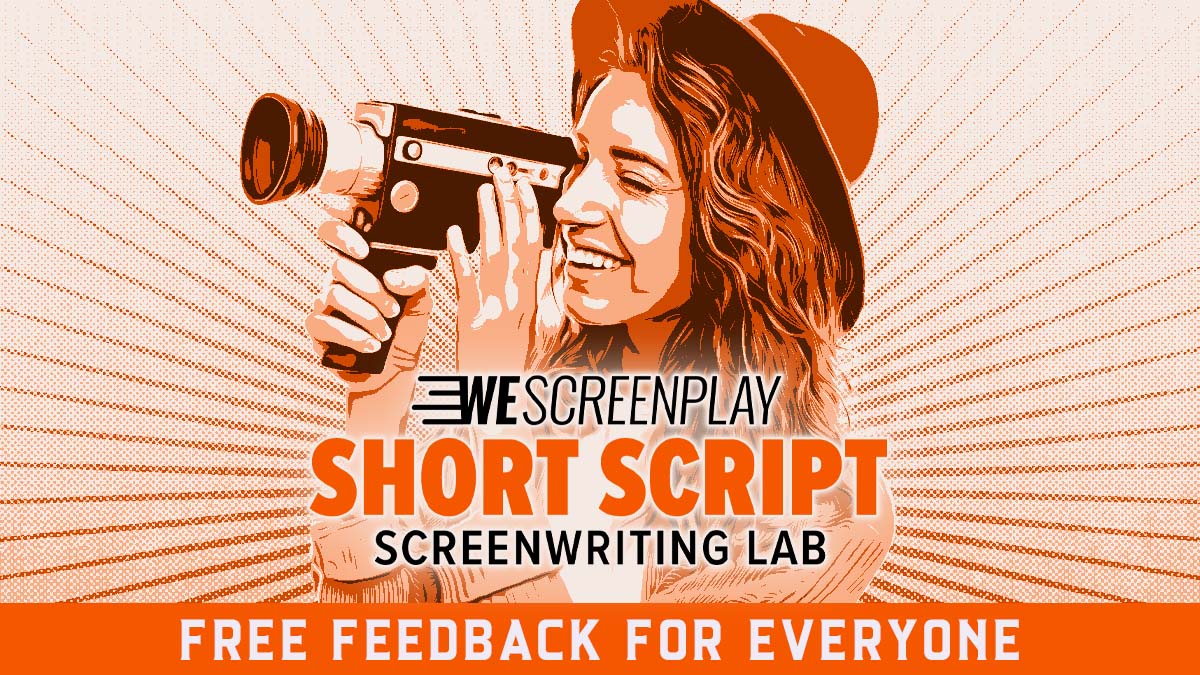
You might be asking yourself if you should write a short script. The clear answer (to us), is yes, of course! Whether you’re an emerging writer or an experienced filmmaker, there are many great reasons to write a short film. While shorts do have the potential for major career accolades (hello, Academy Awards short film categories), the greatest thing about short films is the artistry that goes into creating them.
Speaking of Academy Award-winning short films, the WeScreenplay Shorts Screenplay Contest features a jury of Oscar-winning short film writers and directors! Learn more and submit your screenplay for them to read here.
Unlike a feature film or television screenplay, shorts can really upend traditional storytelling and take artistic risks. They’re like the poetry of the filmmaking world. They don’t precisely require the type of ‘beginning, middle, and end’ sequencing that features do — nor should they. A great short film starts late and leaves early, making them highly compelling.
Here are six specific reasons writing a short film is worth exploring:
- Calling Card
Short scripts serve as great writing samples. It doesn’t take very long for a reader to be hooked by a script; it’s pretty common for the industry to refer to “the first ten pages” because by then a reader will know whether or not they want to actually keep reading.
In a feature, television pilot, or spec script, ten pages is just getting started. In a short film, however, it’s about the average page length — the sweet spot of telling your full narrative. In ten pages, you can show a reader how you build worlds, dream up characters, play with dialogue, and tell an entire story. It’s your chance to hook someone from start to finish.
- Proof of Concept
If you’ve written a feature film and you want to sell it or produce it yourself, creating a short film as a proof of concept of the feature is a great way to communicate your vision. Whiplash is a perfect example — and not just because someone succinctly compared the short film and the feature in the video above, which is absolutely worth watching.
Writer/Director Damien Chazelle created his Whiplash short film after writing and pitching his feature script. Chazelle had some interest in the feature but financiers couldn’t quite understand his vision. A producer suggested Chazelle pick a scene and shoot it — which is exactly what he did (watch the video above and thank me later!).
“Not only did it arouse interest in the project that hadn’t existed before, it also allowed me to get my feet wet, to fine-tune what I really wanted this movie to be,” Chazelle recalled.
He got the funding he needed and, of course as we know, the film was a critical success.
- Experience
Write a short film because you want to fine-tune your writing skills. It’s actually rather tricky to tell such a succinct story in a satisfying and entertaining way.
Maybe you’re experimenting with a new genre, maybe you need some space between projects, or maybe you just want to play — a short film is a great way to work your skills.
- Festival Strategy
Make no mistake: just because a short film is shorter does not necessarily mean it’s easier to write well — at least from a competitive perspective. In 2016, Sundance received 9000 short film submissions (compared to 4000 feature films) — and only about 60 were selected to screen.
Still, shorts will most likely have a more manageable budget and production schedule, making them more accessible to filmmakers. With a smart festival strategy, you could write a short that goes on to open doors at great festivals, giving you access to a network of filmmakers you can connect with.
The most important thing if you are interested in screening at festivals is to watch shorts that screened at those festivals. Extra credit: get your hands on their screenplays and read, read, read.
- Contests/Grants
Short screenplay contests and grants are great ways to gain access to industry professionals and, perhaps more significantly depending on your goals, help you obtain some funding for future projects. Of course, it’s always best to do your research into the programs to see which ones are worth the entry fees — and to study projects that have been successful in the past.
Also read: Why contests matter even if you don’t win
- Awards
Remember, short films are, well, shorter. They have a smaller budget. They require fewer cast and crew. They take less time to create. With modern technology, short films are more accessible than they’ve ever been.
If you have an incredible idea and the means to bring it to fruition, there are world-class awards categories out there for you to capitalize on. The Academy Awards and The Emmys have short film categories.
You will probably not earn your money back on a short film (it’s not impossible, of course, with digital distribution options), but if you’re smart about how you invest your time and money, you can write a short film that could take you all the way to the Oscars.
Interested in having your script read by Academy Award winning/nominated filmmakers? Submit to our WeScreenplay Shorts Screenwriting Contest now!

 Shannon Corbeil is a writer, actor, and filmmaker in Los Angeles with recent appearances on SEAL Team and The Rookie. An Air Force veteran, her articles have been published in Business Insider, We Are The Mighty, and Military.com, and she has written and produced hundreds of digital videos with millions of views. You can read more about her on her website or come play on Instagram and Twitter!
Shannon Corbeil is a writer, actor, and filmmaker in Los Angeles with recent appearances on SEAL Team and The Rookie. An Air Force veteran, her articles have been published in Business Insider, We Are The Mighty, and Military.com, and she has written and produced hundreds of digital videos with millions of views. You can read more about her on her website or come play on Instagram and Twitter!
For all the latest from WeScreenplay, be sure to follow us on Twitter, Facebook, and Instagram.
















